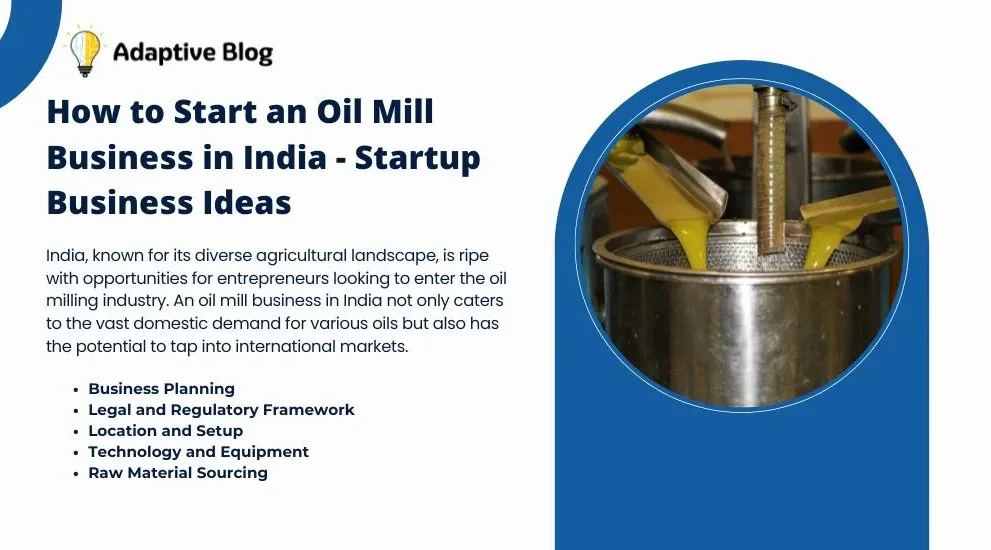How to Start an Oil Mill Business in India – Startup Business Ideas

India, known for its diverse agricultural landscape, is ripe with opportunities for entrepreneurs looking to enter the oil milling industry. An oil mill business in India not only caters to the vast domestic demand for various oils but also has the potential to tap into international markets.
This comprehensive guide will walk you through the process of starting an oil mill business in India, focusing particularly on the lucrative area of groundnut oil processing.
Here are some ideas for starting an oil mill business in India:
Market Research and Feasibility Study
Before diving into the oil mill business, it’s crucial to understand the market dynamics. India consumes a wide range of oils, with mustard, coconut, sesame, soybean, and groundnut oil being among the most popular. Each type of oil has its specific market, influenced by regional preferences and cooking practices.
Market research should focus on identifying the most demanded oils in your target area and understanding the consumer behaviour surrounding these products. Analyzing competitors and current trends will also give you insights into what works and what doesn’t. A thorough economic feasibility study will help you estimate potential profitability and guide your business decisions.
Business Planning
A well-crafted business plan is your roadmap to success in the oil milling industry. It should detail your chosen business model, whether it’s operating an integrated mill, focusing on contract production, or specializing in niche oils. Key components of the business plan should include:
● Marketing strategy: How will you reach your customers? What channels will you use?
● Operational plan: What is the daily operation going to look like?
● Financial projections: What are your expected expenses and revenues?
This plan will also be crucial in securing financing, as it will show potential investors or banks how you intend to make your business profitable.
Legal and Regulatory Framework
Starting an oil mill in India requires navigating a series of legal and regulatory frameworks. At the forefront is obtaining the necessary licenses and registrations, including:
● FSSAI license: As a food product, oils require clearance from the Food Safety and Standards Authority of India.
● Udyog Aadhaar registration: For small and medium enterprises, this is vital for government scheme benefits.
● GST registration: Necessary for all businesses operating in India today.
You’ll also need to consider environmental clearances, particularly if your processing methods involve solvent extractions or other potentially hazardous activities.
Location and Setup
Choosing the right location is critical for the operational success of your oil mill. It should ideally be close to raw material sources to minimize transportation costs. Accessibility to markets and the availability of basic infrastructure like electricity, water, and transport links are also important.
The setup of your plant should comply with local zoning and environmental regulations to avoid future legal complications.
Technology and Equipment
The choice of technology and equipment will significantly impact the efficiency and quality of the oil produced. Modern extraction methods, while more expensive, offer greater efficiency and yield compared to traditional methods. When choosing equipment, consider factors such as:
● Operational ease
● Maintenance costs
● Longevity and scalability
Investing in high-quality machinery from the start can reduce downtime and maintenance costs, contributing positively to your bottom line.
Raw Material Sourcing
For those looking to start groundnut oil manufacturing, securing a reliable supply of high-quality groundnuts is essential. Building relationships with local farmers and wholesalers can ensure a steady supply of raw materials. You may also consider contracts that stipulate quality requirements to maintain consistency in your product output.
Production Process
The production process in an oil mill involves several key steps, each requiring careful quality control:
● Extraction: This can be done through mechanical pressing or chemical solvents, depending on the desired quality and production scale.
● Refining: Crude oil is refined to remove impurities, which involves processes like neutralization, bleaching, and deodorization.
● Packaging: The final oil needs to be packaged in a way that maintains its quality and meets regulatory standards for sale.
Quality control is crucial throughout these processes to ensure the final product meets or exceeds customer expectations and regulatory standards.
Marketing and Sales
Marketing your oil effectively is essential to business success. This involves developing a strong brand identity and using appropriate marketing channels to reach your target audience. Digital marketing can be particularly effective, along with traditional methods like trade fairs and direct sales to businesses.
Financial Management
Understanding the financial aspects of running an oil mill is vital. This includes managing costs, pricing products competitively, and keeping detailed financial records. Initial investment can be substantial, so exploring funding options such as bank loans, angel investors, or government grants is important.
Challenges and Risk Management
The oil mill business is not without its challenges. These can include fluctuating raw material prices, regulatory changes, and technological disruptions. Effective risk management strategies are essential to mitigate these risks and ensure the long-term viability of your business.
Also Read: Tips for Improving Creditworthiness to Secure a Personal Loan for Salaried Employees
Conclusion
Starting an oil mill business in India, especially one focused on Groundnut Oil Production and milling offers substantial opportunities for entrepreneurs willing to navigate the complexities of the food production industry.
With careful planning, adherence to legal requirements, and effective marketing, your oil mill can grow into a profitable venture. As you embark on this exciting entrepreneurial journey, remember that thorough preparation and a clear strategic vision are the keys to success.





